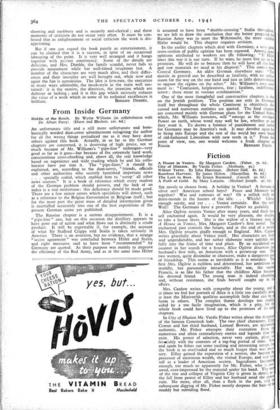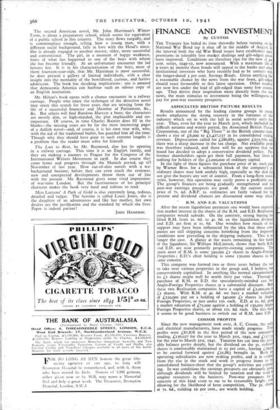Fiction
Six novels to choose from. A holiday in Venice? A fortune in silver ore? American school boys? Peace and Memory lost together? War and rumours of war? Or a rollick with demi-monde in the haunts of the idle. . . . Which? Choice enough surely, and yet . . . Venice certainly. But the rest? Well! The Germans have a proverb: Papier ist geduldig.
Alice Ogilvie revisits Venice after many years, and finds her self enchanted again. It would be very pleasant, she deci to take a house there. She is the widow of a literary man A House in Venice, Mrs. Margaret Cardew's first novel. Th enchanted past controls the- future, and at the end of a month Mrs. Ogilvie returns gladly enough to England. Mrs. Cardo writes gracefully about Venice itself. Her characters are lively and unpredictable, and her rather elaborate story unfolds ski!- fully into the frame of time and place. By an accidental en- counter in her search for a house, Alice Ogilvie discovers he: husband's first wife, an American with a grown-up son. The two women, quite dissimilar in character, make a dangerous paet of friendship. This seems as inevitable as it is mistaken Thc first Mrs. Ogilvie is ruthless and determined, her ambitions are worldly, her personality intractable. Her son, the scan Francis, is so like his father that the childless Alice becomes his devoted friend. The young man is indeed charm and, without resistance, she finds herself caught up in affairs.
Mrs. Cardew writes with sympathy about the young, and at times we feel her portrait of Alice is a little too carefully don at least the Miniverish qualities accomplish little that can be harm to others. The complex theme develops too readily aided by a too facile imagination, which is a pity, for whole book could have lived up to the promises of its chapters.
In City of Illusion Mr. Vardis Fisher writes about the discov of the famous Comstock lode. The two chief characters, Eli Cowan and her third husband, Lemuel Bowers, are apparen authentic. Mr. Fisher attempts their recreation from numerous and often contradictory stories and legends that s exist. His power of selection, never very certain, plays t fevacishly with the contents of a rag-bag period of time. N and again he fishes out some 'exciting and interesting scraps, the book is so overloaded and so much longer than was net sary. -Eilley gained the reputation of a seeress, she became possessor of enormous wealth, she visited Europe, and saw ha self as a leader of American society. Ingredients fascina enough, too much so apparently for Mr. Fisher, who is ov awed, over-impressed by the material under his hand. The St of the rise and collapse of Virginia City is given in detail, as the fall from power of Miley and her husband amid the gmn ruin. No more, after all, than a flash in the pan, and subsequent digging of Mr. Fisher merely deepens the haze of muddy but subsiding flood. The second American novel, Mr. John Harriman's Winter Term, is about a preparatory school, which seems the equivalent of a public school in this country. The story flows turgidly, and is commonplace enough, telling how a young man, with a different social background, falls in loge with the Head's niece. She is already engaged to another master, older, more successful and conventional. The girl, in a moment of happy weakness, hints of what has happened to one of the boys with whom she has become friendly. At an unfortunate encounter the lad betrays her. It is in his characterisation of the boys, most of them fourteen-year-olds, that Mr. Harriman is most successful, he does present a gallery of limited individuals, with a clear insight into the mentality of the bewildered, curious, and furtive adolescent. The book has shocking implications : one is amazed that democratic America can harbour such an odious copy of an English i,nstitution.
Mr. Hilton's book opens with a chance encounter in a railway carriage. People who enjoy the technique of the detective novel may enjoy this search for three years that are missing from the life of a successful financier and Member of Parliament, &c., &c. But others will find Random Harvest a bore; the characters are mostly dim, or high-minded, the plot implausible and un- important. Of course, in time Charles Rainier does fill in the blanks--the missing years are by far the most interesting pages of a dullish novel—and, of course, it is his own true wife, who, with the aid of the traditional butler, has guarded him all the time. Though why they should have gone to such extreme lengths is a problem that the reader must solve for himself.
The Last to Rest, by Mr. Raymond, also has its opening in a railway carriage. This time it is an English family, and they are making a journey to Prague for the Congress of the International Writers Movement in 1938. In due course they come home and progress through the Munich period, up till November of last year. How out-of-date novels with a war background become, before they can even reach the reviewer. new and unexpected developments .throw them out of line with the present. Mr. Raymond gives some vivid impression: of war-time London. But the facetiousness of his principal character makes the book very hard and tedious to read.
Miss Lutyens' A Path of Gold is also extremely long, tedious, detailed and vulgar. The heroine is called Louie Jones, she is the daughter of an adventuress and like her mother, her own desires are the justification and the standard by which she lives Paper is indeed patient!
JOHN HAMPSON.



























 Previous page
Previous page